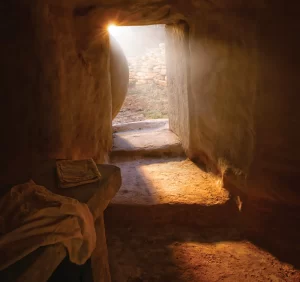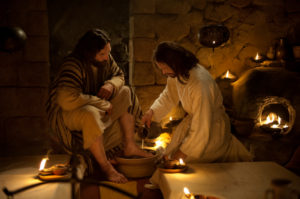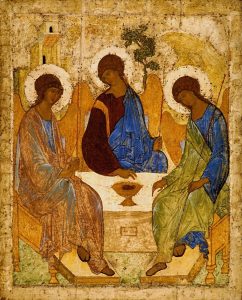Seeing… Understanding… Believing…
The gradual process of perception…
The slowly evolving recognition…
The graced-filled experience of FAITH!
The text offered to our reflection on this Easter Sunday (John 20:1-9)
is an interesting one – interesting and inspiring!
Interesting in that it is linked to the reality of human experience.
Inspiring in how it reveals what goes beyond human experience.
 John and Peter are at the tomb where Jesus has been laid.
John and Peter are at the tomb where Jesus has been laid.
Both of them observe a detail, something that might have escaped the notice of someone else.
We are told that having reached the place first, John (referred to as ‘the other disciple’):
“bent over and looked in at the strips of linen lying there”.
Of Peter, it is said that:
“He saw the strips of linen lying there,
as well as the cloth that had been wrapped around Jesus’ head.
The cloth was still lying in its place, separate from the linen”.
Emptiness… Absence… and… FAITH!
The tomb is empty, no corpse is lying there as was expected.
Jesus is… obviously absent… away…
What the two apostles see are only objects, signs pointing to a reality which they have to interpret.
They do and… they believe!
The text mentions:
“Till this moment, they had failed to understand the teaching of scripture,
that he (Jesus) must rise from the dead”.
Our own faith is also slowly evolving, our perception is gradual, as that of Peter and John was.
We, too, need signs to believe…
They will not be those of pieces of linen and cloth that have been used for Jesus’ body.
The signs given to us will be of a different nature, but no less meaningful and… convincing…
– the help received when most unexpected…
– the information needed that is discovered at the right moment…
– the solution of a problem found where it was not meant to be…
– the prevention of an accident that we deem ‘quite a miracle’…
– the resolution of a conflict that was beyond expectation…
– the healing of a relationship when all seemed lost…
and so many more astonishing happenings that prompt our doubt to yield to genuine faith!
The Risen Lord, who seemed absent, reveals his presence in those areas of emptiness that were NOT empty after all!
Note: Another text is available on a different theme, in French, at: https://image-i-nations.com/dimanche-de-paques-resurrection-du-seigneur-annee-b-2024/
Source: Image: The Church of Jesus Christ of Latter-Day Saints
 The Logo of the European Thyroid Day – 25th May
The Logo of the European Thyroid Day – 25th May  John and Peter are at the tomb where Jesus has been laid.
John and Peter are at the tomb where Jesus has been laid. Within that frame, the General-Assembly took note of all international, regional, national and local initiatives, as appropriate, as well as efforts by religious leaders, to promote interreligious and intercultural dialogue, and in this regard took note also of the meeting between Pope Francis and the Grand Imam of Al-Azhar, Ahmad al-Tayyib, on 4 February 2019 in Abu Dhabi, which resulted in the signing of the document entitled “Human fraternity for world peace and living together”.
Within that frame, the General-Assembly took note of all international, regional, national and local initiatives, as appropriate, as well as efforts by religious leaders, to promote interreligious and intercultural dialogue, and in this regard took note also of the meeting between Pope Francis and the Grand Imam of Al-Azhar, Ahmad al-Tayyib, on 4 February 2019 in Abu Dhabi, which resulted in the signing of the document entitled “Human fraternity for world peace and living together”. In the 1950s the United Nations established the Kiswahili language unit of United Nations Radio, and today Kiswahili is the only African language within the Directorate of the Global Communications at the United Nations. The United Nations General Assembly, through its resolution 71/328 of 11 September 2017, on multilingualism, welcomed implementation of a day dedicated to each of its official languages in order to inform and raise awareness of their history, culture and use, and encouraged the Secretary-General and institutions such as UNESCO to consider extending this important initiative to other non-official languages spoken throughout the world.
In the 1950s the United Nations established the Kiswahili language unit of United Nations Radio, and today Kiswahili is the only African language within the Directorate of the Global Communications at the United Nations. The United Nations General Assembly, through its resolution 71/328 of 11 September 2017, on multilingualism, welcomed implementation of a day dedicated to each of its official languages in order to inform and raise awareness of their history, culture and use, and encouraged the Secretary-General and institutions such as UNESCO to consider extending this important initiative to other non-official languages spoken throughout the world. World Human Spirit Day is observed annually on February 17 as a day to encourage mindfulness through meditation; to get us to form the habit of constant reflection as a way to feel content in our pressure-filled society. According to Daniel Helminiak, it’s “a respected philosopher in the space of spirituality, the spirit is the mental function of awareness, insight, understanding, judgment, and other reasoning.” In Christianity, it is emphasized that the human spirit is the real person; the essential part of our existence.
World Human Spirit Day is observed annually on February 17 as a day to encourage mindfulness through meditation; to get us to form the habit of constant reflection as a way to feel content in our pressure-filled society. According to Daniel Helminiak, it’s “a respected philosopher in the space of spirituality, the spirit is the mental function of awareness, insight, understanding, judgment, and other reasoning.” In Christianity, it is emphasized that the human spirit is the real person; the essential part of our existence. Appreciate All Parents Throughout the World
Appreciate All Parents Throughout the World All kinds of things and situations can keep us awake.
All kinds of things and situations can keep us awake.

 His presence can become close and very real in whatever happens if only we are alert,
His presence can become close and very real in whatever happens if only we are alert, The gospel text of this Easter Sunday made me realize this anew (Jn.20:1-9).
The gospel text of this Easter Sunday made me realize this anew (Jn.20:1-9).
